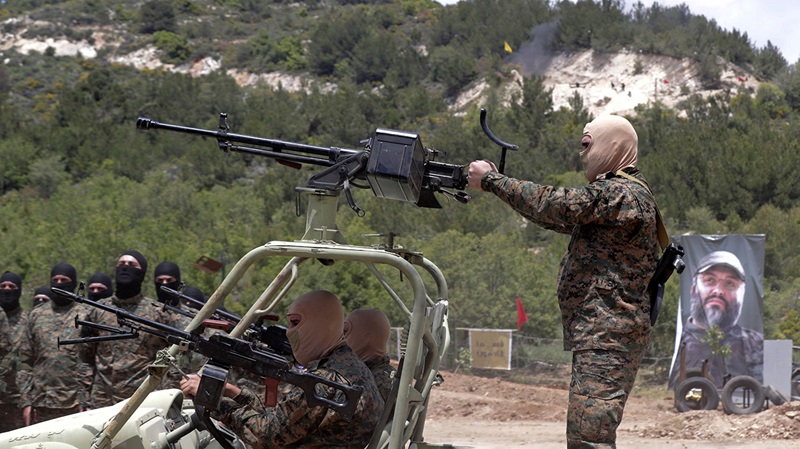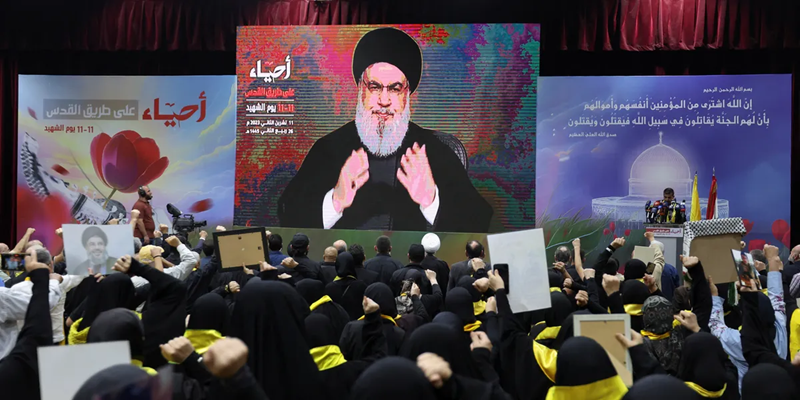Hezbollah’s leader, Hassan Nasrallah, recently issued a warning to Israel about the potential consequences of a war in Lebanon. Nasrallah emphasized the high stakes involved in such a conflict, highlighting the devastating impact it could have on both countries and the region as a whole.
He emphasized that any military confrontation between Hezbollah and Israel would result in significant casualties and destruction, with no clear winner emerging from the conflict. Nasrallah also pointed out that a war in Lebanon would likely draw in other regional powers, further escalating the situation and potentially leading to a wider conflict. In light of these risks, Nasrallah called for a de-escalation of tensions and a diplomatic resolution to any outstanding issues between the two countries.
He stressed the importance of dialogue and negotiation in order to avoid the potentially catastrophic consequences of a military conflict. Nasrallah’s cautionary words serve as a reminder of the high stakes involved in any potential war in Lebanon, and the urgent need for peaceful solutions to be pursued in order to prevent further bloodshed and suffering.

Nasrallah’s Warning: The Consequences of Conflict for Israel
In a recent speech, Hezbollah leader Hassan Nasrallah issued a warning to Israel about the potential consequences of engaging in conflict with Lebanon. Nasrallah emphasized that any aggression from Israel would be met with a strong and unified response from the Lebanese people and their allies.
He highlighted the fact that Hezbollah has significantly strengthened its military capabilities in recent years and is prepared to defend Lebanon against any threats. Nasrallah also pointed out that Israel’s continued occupation of Palestinian territories and its aggressive actions in the region have only fueled tensions and increased the likelihood of conflict.
He warned that any military action by Israel would result in a heavy toll on both sides, with Lebanon being able to inflict significant damage on Israeli cities and infrastructure. Nasrallah’s message was clear: any aggression from Israel would not go unanswered, and the consequences of conflict would be severe for both countries.
The potential for escalation and widespread destruction in the region is a stark reminder of the dangers of continued hostilities and the urgent need for diplomatic solutions to address the root causes of the conflict. It is crucial for both sides to exercise restraint and prioritize peaceful dialogue in order to prevent further bloodshed and devastation in the already volatile Middle East.
The Price of War: What Nasrallah’s Statement Means for Regional Stability
Hassan Nasrallah’s recent statement regarding the price of war has significant implications for regional stability. His acknowledgment of the high cost of conflict highlights the devastating impact that war can have on countries and their populations.
By recognizing the toll that war takes on both sides, Nasrallah is sending a message about the importance of seeking peaceful resolutions to conflicts. This statement also underscores the need for all parties involved to carefully consider the consequences of their actions before resorting to military force. Nasrallah’s comments serve as a reminder that the price of war goes beyond monetary costs, extending to loss of life, destruction of infrastructure, and long-term societal impacts.
In a region already plagued by ongoing conflicts and tensions, Nasrallah’s words serve as a call for greater diplomacy and dialogue in order to prevent further escalation and instability. Ultimately, Nasrallah’s statement highlights the urgent need for all parties to prioritize peaceful resolutions and dialogue in order to achieve lasting stability and security in the region.
By recognizing the high price of war, Nasrallah is urging all involved to consider the long-term consequences of their actions and to work towards peaceful solutions that benefit all parties involved.

Strategic Implications: The Cost of Escalation in the Middle East
The ongoing conflict in the Middle East has far-reaching strategic implications, particularly when it comes to the cost of escalation. As tensions continue to rise between various factions and countries in the region, the potential for a full-scale conflict looms large.
The costs of such escalation are not just financial, but also humanitarian and geopolitical. The toll on civilian populations, infrastructure, and economies would be devastating, leading to a further destabilization of an already volatile region. In addition, the potential for escalation to draw in other countries with vested interests in the Middle East could have global repercussions.
The strategic implications of a full-scale conflict in the Middle East would be immense, potentially reshaping alliances, power dynamics, and security threats on a global scale. It is crucial for all parties involved to carefully consider the consequences of their actions and strive for diplomatic solutions to prevent further escalation and the potentially catastrophic costs that would accompany it.
The stakes are high, and the need for strategic thinking and cooperation has never been more pressing in order to avoid a costly and destructive escalation in the Middle East.

Preparing for Uncertainty: The Future of Israel-Lebanon Relations
As Israel and Lebanon navigate the complexities of their relationship, it is crucial for both countries to prepare for uncertainty in the future. The longstanding animosity between the two nations has been fueled by various historical, political, and territorial disputes. Despite occasional periods of calm, tensions remain high and the potential for conflict looms large.
Both countries must prioritize open communication, dialogue, and diplomacy in order to build trust and find common ground. Additionally, fostering economic ties and cooperation in areas such as trade, energy, and infrastructure could help create a more stable and prosperous region. It is also essential for Israel and Lebanon to work towards addressing humanitarian issues, such as the plight of Palestinian refugees and the ongoing crisis in Syria, which have further strained their relationship.
Ultimately, the future of Israel-Lebanon relations will require both countries to be flexible, pragmatic, and willing to make concessions in order to achieve lasting peace and stability in the region. By preparing for uncertainty and approaching the future with a spirit of cooperation and mutual respect, Israel and Lebanon can lay the groundwork for a more positive and constructive relationship going forward.
